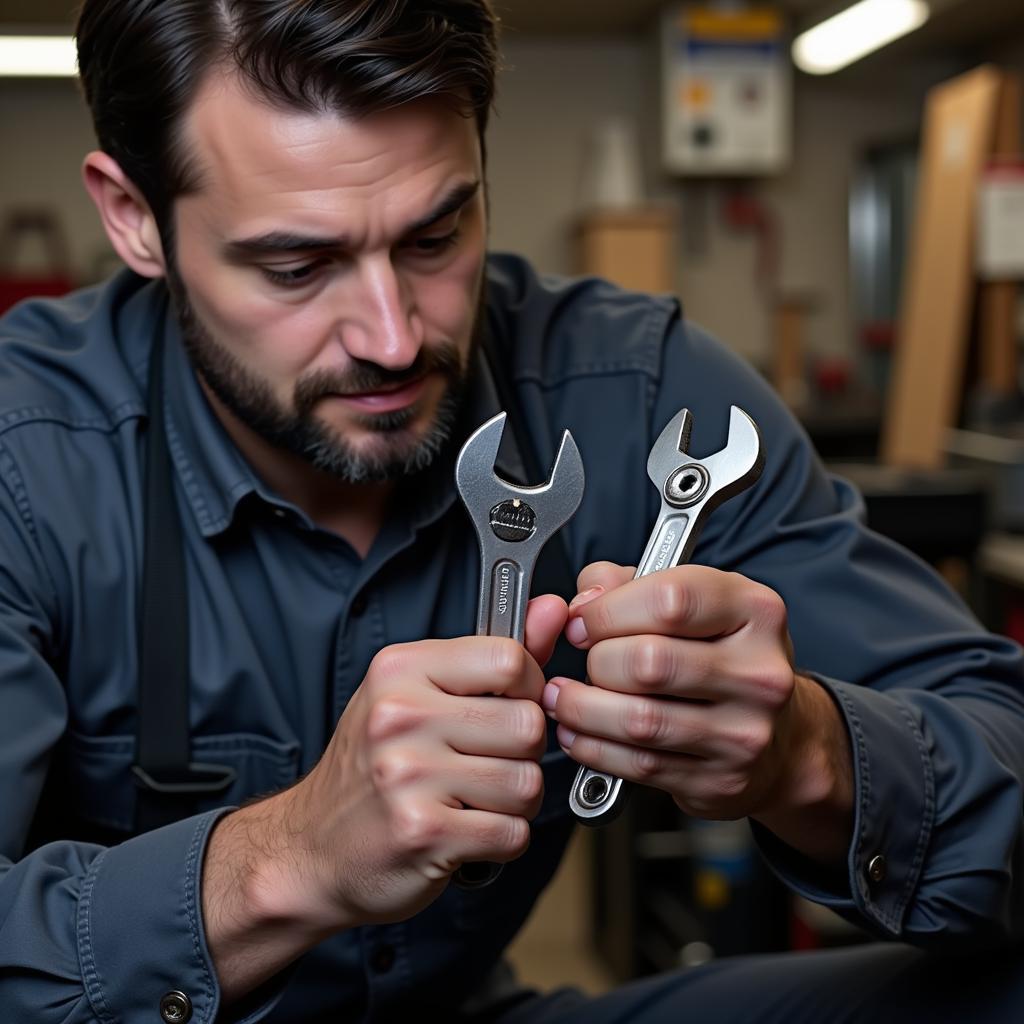Every car mechanic, whether a seasoned professional or a DIY enthusiast, needs a reliable set of tools. Having the right Tools For Car Mechanic work not only makes the job easier but also ensures it’s done correctly and safely. This guide will explore the essential tools for car mechanic tasks, from basic hand tools to advanced diagnostic equipment.
Must-Have Hand Tools for Every Car Mechanic
A solid foundation of hand tools is crucial for any car mechanic. These are the workhorses of your toolkit, allowing you to tackle a wide range of tasks. Essential hand tools include:
- Wrenches: A variety of sizes and types, including combination wrenches, open-end wrenches, and adjustable wrenches are essential for fastening and loosening nuts and bolts.
- Screwdrivers: Phillips head, flathead, and Torx screwdrivers in various sizes are needed for removing and installing screws.
- Pliers: Needle-nose pliers, slip-joint pliers, and locking pliers (like Vise-Grips) are invaluable for gripping, bending, and cutting wires and other small components.
- Sockets and Ratchets: Socket sets with various drive sizes (1/4″, 3/8″, 1/2″) and a range of sockets are fundamental for working with nuts and bolts in tight spaces.
- Hammers: A ball-peen hammer and a rubber mallet are useful for various tasks, from tapping parts into place to removing dents.
For a comprehensive list of essential tools, check out our guide on must have tools for car mechanic.
Power Tools for Enhanced Efficiency
While hand tools are fundamental, power tools can significantly increase efficiency and reduce the effort required for many tasks. Consider these essential power tools:
- Impact Wrench: Quickly removes and installs lug nuts and other fasteners, saving time and effort.
- Drill: Essential for drilling holes and driving screws. A cordless drill offers greater portability and convenience.
- Angle Grinder: Useful for cutting, grinding, and polishing metal.
- Sander: Smooths surfaces and removes rust or paint.
- Air Compressor and Air Tools: An air compressor paired with air tools like impact wrenches, ratchets, and sanders offers powerful and efficient performance.
You might find our article on car mechanical tools helpful for a deeper dive into specific tool categories.
Diagnostic Tools: The Eyes and Ears of a Modern Mechanic
In today’s complex vehicles, diagnostic tools are essential for identifying and resolving issues. These tools provide insights into the inner workings of a car’s systems:
- OBD-II Scanner: Reads diagnostic trouble codes (DTCs) from the vehicle’s computer, providing clues about potential problems.
- Multimeter: Measures voltage, current, and resistance, helping diagnose electrical issues.
- Pressure Gauge: Measures fluid pressure in various systems, such as the fuel system, cooling system, and braking system.
- Vacuum Gauge: Measures engine vacuum, which can indicate problems with the engine’s internal components.
- Oscilloscope: Analyzes electrical signals, providing detailed information about the operation of various sensors and actuators.
If you’re interested in exploring more advanced diagnostic tools, take a look at our article on heavy duty car diagnostic tools.
Choosing the Right Tools: Quality and Budget
Investing in quality tools is a wise decision. Quality tools are more durable, perform better, and are often safer to use. However, it’s important to balance quality with budget. Consider these factors when choosing tools:
- Brand Reputation: Choose reputable brands known for quality and durability.
- Material and Construction: Look for tools made from high-quality materials with solid construction.
- Features and Functionality: Consider the specific features and functionality you need for your work.
- Price: Compare prices from different retailers to find the best deals.
- Warranty: A good warranty can protect your investment in case of defects or malfunctions.
For a selection of recommended tool sets, check out our article on the best car tools set.
 Choosing the Right Car Mechanic Tools
Choosing the Right Car Mechanic Tools
Conclusion
Having the right tools for car mechanic work is crucial for efficiency, accuracy, and safety. From basic hand tools to advanced diagnostic equipment, investing in quality tools is an investment in your success as a mechanic. By understanding the various types of tools available and choosing wisely, you’ll be well-equipped to tackle any automotive repair challenge. Remember, the right tools make all the difference. Check out our comprehensive list of car tools names for a complete overview.
FAQ
- What are the most basic tools for a car mechanic? Wrenches, screwdrivers, pliers, sockets, and ratchets are essential.
- Why are diagnostic tools important? They help identify and resolve issues in modern vehicles by providing insights into the car’s systems.
- How do I choose quality tools? Look for reputable brands, durable materials, and features that meet your needs.
- What are some essential power tools for car mechanics? Impact wrenches, drills, angle grinders, and sanders are commonly used.
- Where can I find a comprehensive list of car tool names? Check out our resource on car tool names for a complete overview.
- Why is an OBD-II scanner essential? It reads diagnostic trouble codes, providing clues about potential problems in the vehicle’s systems.
- What should I consider when choosing a tool set? Balance quality, budget, and the specific tools included in the set.
Need help with car diagnostics? Contact us via WhatsApp: +1(641)206-8880, Email: [email protected] or visit us at 910 Cedar Lane, Chicago, IL 60605, USA. We have a 24/7 customer support team.

Leave a Reply